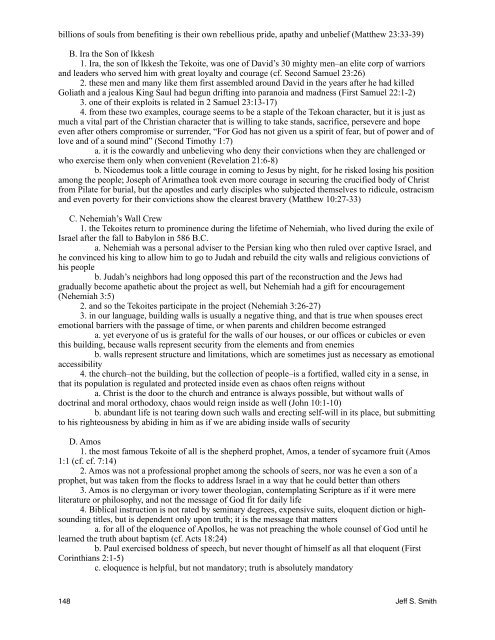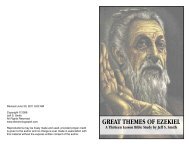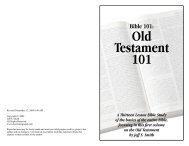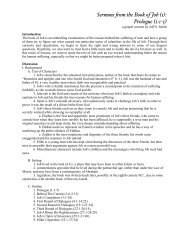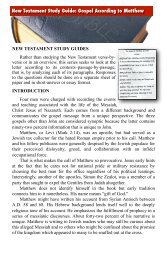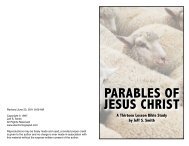Character Studies - ElectronicGospel
Character Studies - ElectronicGospel
Character Studies - ElectronicGospel
- No tags were found...
Create successful ePaper yourself
Turn your PDF publications into a flip-book with our unique Google optimized e-Paper software.
illions of souls from benefiting is their own rebellious pride, apathy and unbelief (Matthew 23:33-39)B. Ira the Son of Ikkesh1. Ira, the son of Ikkesh the Tekoite, was one of David’s 30 mighty men–an elite corp of warriorsand leaders who served him with great loyalty and courage (cf. Second Samuel 23:26)2. these men and many like them first assembled around David in the years after he had killedGoliath and a jealous King Saul had begun drifting into paranoia and madness (First Samuel 22:1-2)3. one of their exploits is related in 2 Samuel 23:13-17)4. from these two examples, courage seems to be a staple of the Tekoan character, but it is just asmuch a vital part of the Christian character that is willing to take stands, sacrifice, persevere and hopeeven after others compromise or surrender, “For God has not given us a spirit of fear, but of power and oflove and of a sound mind” (Second Timothy 1:7)a. it is the cowardly and unbelieving who deny their convictions when they are challenged orwho exercise them only when convenient (Revelation 21:6-8)b. Nicodemus took a little courage in coming to Jesus by night, for he risked losing his positionamong the people; Joseph of Arimathea took even more courage in securing the crucified body of Christfrom Pilate for burial, but the apostles and early disciples who subjected themselves to ridicule, ostracismand even poverty for their convictions show the clearest bravery (Matthew 10:27-33)C. Nehemiah’s Wall Crew1. the Tekoites return to prominence during the lifetime of Nehemiah, who lived during the exile ofIsrael after the fall to Babylon in 586 B.C.a. Nehemiah was a personal adviser to the Persian king who then ruled over captive Israel, andhe convinced his king to allow him to go to Judah and rebuild the city walls and religious convictions ofhis peopleb. Judah’s neighbors had long opposed this part of the reconstruction and the Jews hadgradually become apathetic about the project as well, but Nehemiah had a gift for encouragement(Nehemiah 3:5)2. and so the Tekoites participate in the project (Nehemiah 3:26-27)3. in our language, building walls is usually a negative thing, and that is true when spouses erectemotional barriers with the passage of time, or when parents and children become estrangeda. yet everyone of us is grateful for the walls of our houses, or our offices or cubicles or eventhis building, because walls represent security from the elements and from enemiesb. walls represent structure and limitations, which are sometimes just as necessary as emotionalaccessibility4. the church–not the building, but the collection of people–is a fortified, walled city in a sense, inthat its population is regulated and protected inside even as chaos often reigns withouta. Christ is the door to the church and entrance is always possible, but without walls ofdoctrinal and moral orthodoxy, chaos would reign inside as well (John 10:1-10)b. abundant life is not tearing down such walls and erecting self-will in its place, but submittingto his righteousness by abiding in him as if we are abiding inside walls of securityD. Amos1. the most famous Tekoite of all is the shepherd prophet, Amos, a tender of sycamore fruit (Amos1:1 (cf. cf. 7:14)2. Amos was not a professional prophet among the schools of seers, nor was he even a son of aprophet, but was taken from the flocks to address Israel in a way that he could better than others3. Amos is no clergyman or ivory tower theologian, contemplating Scripture as if it were mereliterature or philosophy, and not the message of God fit for daily life4. Biblical instruction is not rated by seminary degrees, expensive suits, eloquent diction or highsoundingtitles, but is dependent only upon truth; it is the message that mattersa. for all of the eloquence of Apollos, he was not preaching the whole counsel of God until helearned the truth about baptism (cf. Acts 18:24)b. Paul exercised boldness of speech, but never thought of himself as all that eloquent (FirstCorinthians 2:1-5)c. eloquence is helpful, but not mandatory; truth is absolutely mandatory148! Jeff S. Smith


